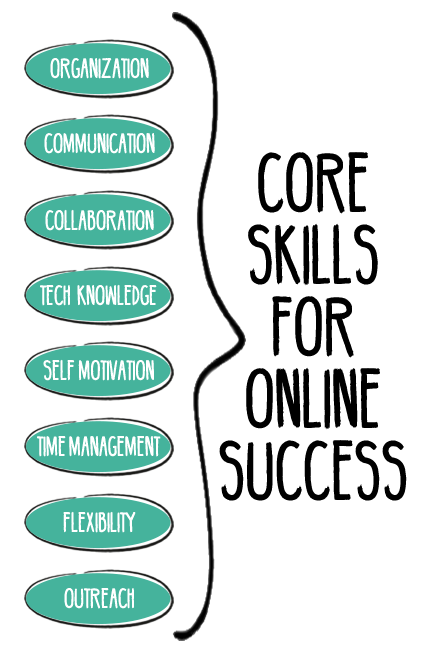Explore Core Competencies
In addition to subject area expertise, there are some core skills that SUNY Online Teaching considers essential to have as an online instructor.

You will be relying on these core skills when teaching and managing online courses:
Organization: Teaching online requires a new conceptualization of your teaching approach within a technology-enabled environment, including content presentation, learning objectives, activities, feedback, evaluation, and assessments. As with any class, you will need to organize and structure your learning materials, design effective and engaging learning activities and interactions, and implement assessment strategies. In online classes, you need to be sure that these learning materials are effective, engaging, and well organized so that your students can find their way around without getting lost, confused, or frustrated.
Communication: In the online environment, you may be communicating with your students through email, announcements, discussion forums, the grade book, or virtual meeting applications. Being responsive, keeping students on task, communicating progress, and providing feedback are all essential faculty responsibilities in the online classroom. The ability to anticipate student needs and questions and communicate them through the design of the course, as well as the ability to convey course goals, expectations, instructions, and desired outcomes clearly and consistently are also essential.
Collaboration: The online classroom is an ideal collaborative environment where you will work together with students to help them achieve their learning goals. As an instructor, your role is to facilitate this collaboration, through the design of class projects and online interaction forums. Collaborating with fellow instructors who are teaching online will also help guide your own mastery and continuous improvement of online teaching skills.
Technology Proficiency: You do need to master the Learning Management System (LMS) at your institution in order to teach online, but that does not mean that you need to be an expert technologist. You should know how to use basic LMS course features and functions – adding and updating content, creating discussion forums, posting announcements, creating assignment drop box areas, creating quizzes, and the like. You will most likely have online instructional designers and instructional technologists at your institution to partner with to master these tools.
Self-Motivation: We hear a lot about students needing to be self-motivated to succeed in online courses, and it is just as important for online instructors to be self-motivated! When you teach online, there’s no physical classroom where you need to be at a specific time. As an online instructor, you will need to be disciplined enough to focus on your teaching responsibilities at your own direction.
Time Management: Keeping yourself on task in the online teaching environment is just as important as keeping students on task! Time management for online instructors is about committing to the time it takes to develop a complete course prior to the first day of class, and being diligent and present in teaching and managing your course once it is underway. Setting expectations is key — you will need to let students know when they can expect you to respond to messages, grade assignments, and be available online. Being able to manage your time is important to your success, and will help you not become overwhelmed while teaching online.
Flexibility: Being able to adapt to new approaches and new pedagogies will help you succeed as an online instructor. Successful online instructors have a willingness to rethink how they teach and how their students learn online. Flexibility means being open to new possibilities and new ways of doing things. Technology changes rapidly these days, and although you do not need to keep up on every new tool and application, you do need to be open and flexible enough to learn from the changes as they happen around you, and continuously refine and improve your online course design and online teaching practices.
Outreach: Teaching online does not happen in a vacuum. You will have access to resources and support provided by your own institution, and by the SUNY Online Teaching unit. You can take advantage of formal and informal professional development, connect with the community of online practitioners across the system, and engage with your home institutional support, including instructional designers, instructional technologists, librarians, and other online faculty. You will also have opportunities to share what you know, participate in research, conduct online course reviews, and connect via peer networking. Knowing how to cultivate and engage with these support networks will provide you with an advantage, and help you over those bumps in the road if, and when, they arrive.
MORE TO EXPLORE
Guidelines for Online Teaching Success
This article introduces the extensive work done by Penn State’s World Campus faculty development team in support of identifying and describing the core competencies for online teaching success.
http://www.facultyfocus.com/articles/distance-learning/guidelines-for-online-teaching-success/
The Most-Needed Competency for Online Instructors
This article from Academic Impressions offers practical strategies from thought leaders Larry Ragan, Susan Ko, and Brian Redmond on how faculty can develop a key competency for online teaching.
https://www.academicimpressions.com/news/most-needed-competency-online-instructors
Penn State Online Competencies for Online Teaching Success
This video playlist showcases faculty impressions of core competencies required to teach online. Each video offers insight into applied effective practices to support faculty success, as well as online learner engagement.
This video series covers different competencies for teaching online.
Online Teaching & Learning Success Techniques Part 1, Part 2, Part 3
The Identification of Competencies for Online Teaching Success
This exploratory study examines teaching behaviors, attitudes, and beliefs that reflect potential competencies for online teaching success. Results of formed the basis of faculty development efforts aimed at providing faculty with professional development in critical competencies to ensure online teaching success.
http://files.eric.ed.gov/fulltext/EJ971040.pdf
